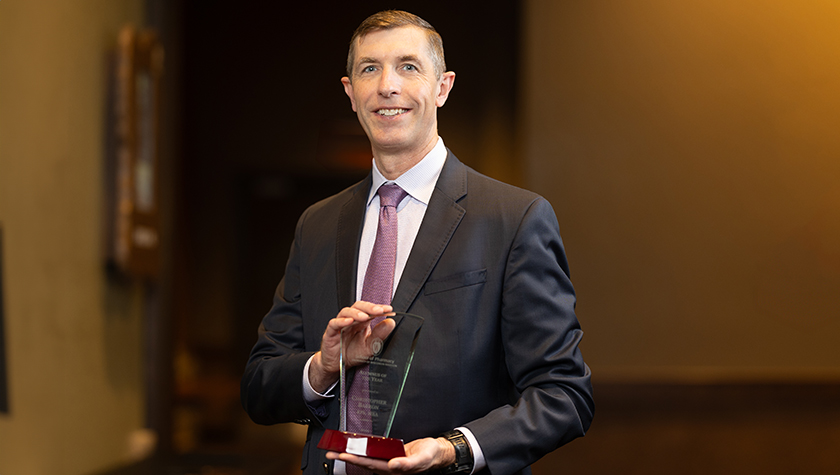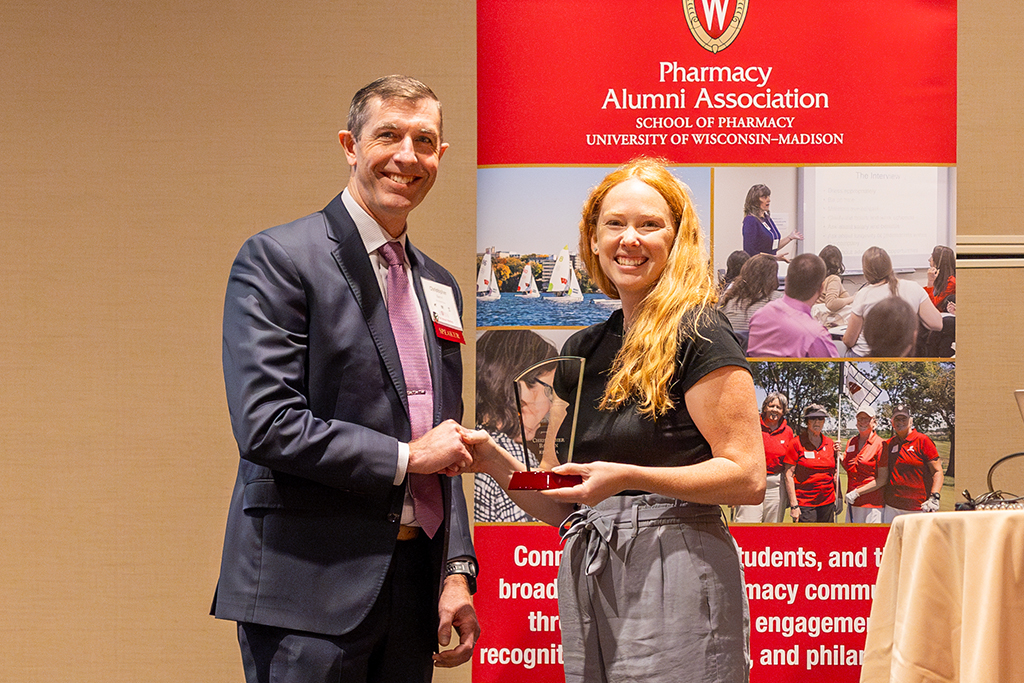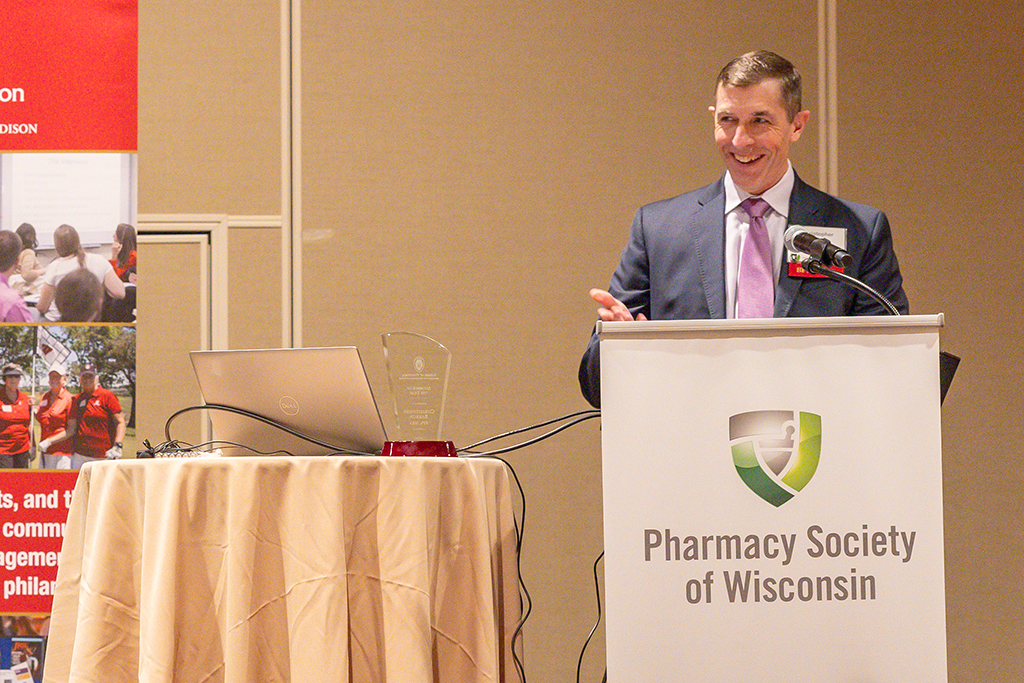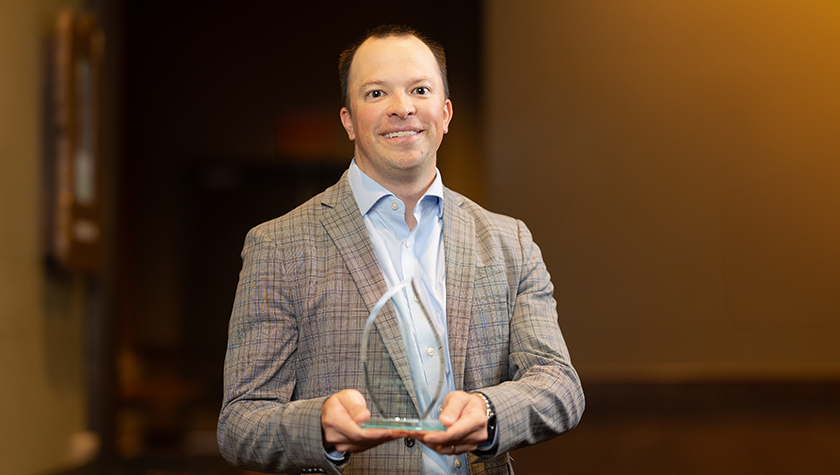
As an advocate for rural health care, Barron leverages population health to reduce disparities in health outcomes
By Archer Parquette
Christopher Barron’s (BS ’97) father was a pharmacist — so when Barron graduated from high school, he “tried not to be one.” The young man from Milton, Wisconsin, wanted to do something different. He entered college as a chemical engineering major.
But something unexpectedly drew him back to his father’s career: the military. Late in 1990, in the leadup to the Gulf War, Barron left college and enlisted in the Army Reserve. He was sent to Fort Sam Houston in Texas, where he trained at the Brooke Army Medical Center. Inside those hospital corridors, he got his first introduction to hospital pharmacy and realized the life-changing (and saving) effect a good pharmacist can have.
“That really changed my career path to pharmacy,” says Barron, who served as a pharmacy specialist with the reserves for eight years. “I was drawn to critical care and emergency medicine. I liked the immediate satisfaction of seeing your impact.”
“I’m overwhelmed by the recognition. I admire so many people who’ve earned this award.”
—Christopher Barron
Upon completion of his army training, Barron transferred to the UW–Madison School of Pharmacy to pursue his new passion. Now he is the executive director of population health and clinical services with Fort HealthCare in Fort Atkinson, Wisconsin. As an advocate for rural health care, he uses data to identify health disparities between groups and promotes interventions to achieve better patient outcomes.
“The Wisconsin Idea — the idea of doing good in the world — shaped me,” Barron says.
This year, he’s being honored with the School of Pharmacy’s Alumnus of the Year award for his work and his ongoing contributions to the field and the School.
“I’m overwhelmed by the recognition,” Barron says. “I admire so many people who’ve earned this award.”
Pharmacy and population health
While studying at UW–Madison, Barron worked part time as a pharmacy technician and intern at Fort HealthCare. The independent hospital system, serving Jefferson County, drew his interest due to its rural focus — it reminded him of his home in Milton.
After graduation, he worked as a pharmacist at several hospitals around Wisconsin before returning to Fort HealthCare in 2007 as a staff pharmacist. He was quickly promoted to pharmacy director two years later. Around the same time, another unexpected shift changed his career’s trajectory — the 2008 financial crisis. The massive economic downturn, and resulting layoffs across industries, triggered his “survival instinct,” he says.

“My approach to work before that was different,” he says. “During the financial crisis, you didn’t know what was coming next. I wanted to be certain that I was providing value. I had a mindset shift. I started thinking at an organizational level to bring value to the organization.”
Barron looked beyond just the pharmacy department and started presenting ideas to improve Fort HealthCare as a whole, using data to find ways to improve outcomes more broadly. His new approach didn’t go unnoticed. When the company was looking to create a new leadership role in population health, they turned to him.
Population health is a relatively new field that’s quite different from traditional pharmacist roles. Barron is Fort HealthCare’s executive lead for both external, community-level population health efforts, as well as focused, clinical-level population health management efforts. Additionally. he serves as the health equity executive for Fort HealthCare, creating and championing the Fort HealthCare health equity strategy to identify and reduce health disparities in the community.
Barron’s biggest focus is the disparity between urban and rural communities. People living in rural areas, in general, see worse health outcomes than those in cities and suburbs due to a lack of easy access to health and pharmacy resources.
“Rural itself is a marker of inequity,” he says. “We in rural populations are all disadvantaged by place. Then within rural populations, there are also inequities we must consider.”

One such inequity is in breast cancer screenings. Every year, Barron analyzes a multitude of health measures to identify disparities in care and drafts a health equity priority plan to guide Fort HealthCare in the year ahead. In the past, there was a significant gap in breast cancer screenings for underserved communities. The Fort HealthCare team, working together with community partners, implemented a voucher program to provide free mammograms for the uninsured, among other interventions.
“All of that work is paying off now,” Barron says. “As we measure many of our health inequities, breast cancer screening is now a bright spot. That focused work has produced a very low level, if any, health disparity in breast cancer screenings across a variety of dimensions. We’re trying to take what we’ve learned there and apply it to other areas.”
This year, Barron is focusing on addressing disparities in colorectal cancer screenings, diabetes and hypertension. Barron and the Fort HealthCare team found that there was disparity when it came to treating Hispanic people for diabetes, and he’s helping to implement Spanish-language outreach, among other potential interventions.
Reshaping rural care
“It all starts with the culture of the organization. Our size gives us lots of advantages. We’re able to do progressive things rapidly,” Barron says. “We’re shaping and influencing things outside of Fort HealthCare on state, regional, and federal levels.”
Barron has co-written and directed a federal grant to expand Fort HealthCare’s advanced data modeling to detect and reduce disparities. He serves on the board of directors for the Wisconsin Collaborative for Health Care Quality, where he works on the group’s health disparity initiatives. Barron recently contributed to their Health Disparities Improvement Toolkit.
He also maintains a close relationship with the School of Pharmacy, where he was a clinical instructor for three years, participated in a webinar about pharmacists’ role in population health, and frequently lectures to PharmD classes about pharmacy careers.
“I want to help students see the benefits of going into rural health care. I’m trying to build a pipeline of students that want to be in rural areas,” he says. “There’s a Rural Health Program at the School of Pharmacy now — that wasn’t there when I attended. Fort HealthCare now also has a pharmacist residency program to train future rural pharmacists. Those programs are a testament to all the hard work of many people helping everyone see the importance of rural health care.”

